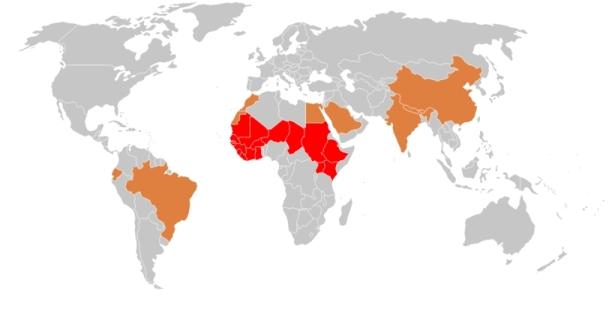Thanks to a massive vaccination campaign launched in 2010, meningitis A has almost disappeared from sub-Saharan Africa.

Meningitis A has almost been eradicated from countries in sub-Saharan Africa. “It’s something really historic that we have accomplished,” said Steve Davis, CEO of PATH, at a vaccination convention in Addis Ababa (Ethiopia).
The American non-governmental organization and the World Health Organization (WHO) had started a mass vaccination campaign at the end of 2010 to face the regular epidemic waves of the “meningitis belt”.
This area, which crosses Africa from Senegal to Ethiopia, suffered significant attacks of the disease every seven to twelve years. In 1996, a particularly virulent epidemic affected more than 250,000 people, causing 25,000 deaths and leaving serious consequences among the survivors.

In red, the “meningitis belt”. Source: WHO
A suitable and effective vaccine
Responding to a call from the authorities of various African countries, the NGOs then began a development work of more than ten years leading to the manufacture of the vaccine.
In five years, the two NGOs have vaccinated more than 235 million people aged 1 to 29 in 16 of the 26 countries in the region. “We have created an affordable, effective and tailor-made vaccine for Africa,” added Steve Davis. It costs less than 50 cents, and has been approved by the WHO for use even after four days of storage at temperatures above 40 ° C, making it easier to use in remote areas.
Establishment of a vaccination routine
Mass vaccination has borne fruit: in 2015, only 80 cases were recorded, in countries that did not join the campaign. A pivotal period of stabilization is now beginning.
Eight countries have already signed up for childhood immunization programs to continue the eradication effort. “This great success against meningitis A should in no way be considered permanent”, warned Dr Matshidiso Moeti, WHO Africa manager. “To ensure continuity of protection, all countries at risk must complete ongoing campaigns and incorporate the vaccine into childhood immunization programs.”
If the effort is not continued, experts estimate that meningitis could reappear within 15 years.
.














